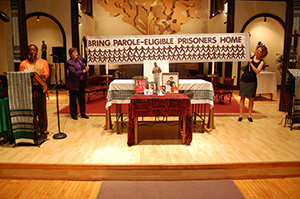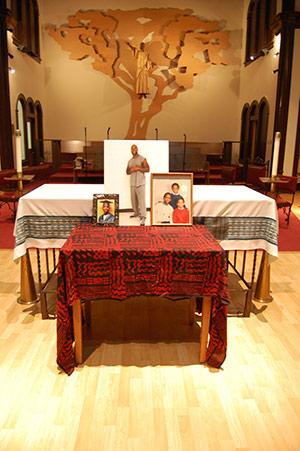St. Martin de Porres Parish is located on Second and Burleigh streets in a part of Milwaukee to which not many non-residents are drawn, especially as the sun sets. But on Tuesday evening, Oct. 20, individuals from the neighborhood, outside the neighborhood and parishioners gathered to talk about Wisconsin parole reform.
 As Beverly Walker, at podium, speaks, Racine Dominican Sr. Fran Hoffman, left, and Rebecca Moczulewski hold up a homemade sign at St. Martin de Porres Parish, Milwaukee on Oct. 20. Parishioners and non-parishioners gathered to advocate for parole-reform during an event sponsored by WISDOM. Sr. Fran, Walker, Moczulewski and others read letters from prisoners eligible for parole but haven’t had it granted.“We don’t want to deal with the lower class so we make them disappear to prison,” Capuchin Fr. David Pruess, pastor of St. Martin de Porres, said. “Ultimately, we have to figure out how to rehab people … pure punishment isn’t going to do it.”
As Beverly Walker, at podium, speaks, Racine Dominican Sr. Fran Hoffman, left, and Rebecca Moczulewski hold up a homemade sign at St. Martin de Porres Parish, Milwaukee on Oct. 20. Parishioners and non-parishioners gathered to advocate for parole-reform during an event sponsored by WISDOM. Sr. Fran, Walker, Moczulewski and others read letters from prisoners eligible for parole but haven’t had it granted.“We don’t want to deal with the lower class so we make them disappear to prison,” Capuchin Fr. David Pruess, pastor of St. Martin de Porres, said. “Ultimately, we have to figure out how to rehab people … pure punishment isn’t going to do it.”
The event was organized by WISDOM, a grassroots, faith-based coalition that addresses social justice issues. It is comprised of: MICAH (Milwaukee Innercity Congregations Allied for Hope), CUSH (Congregations United to Serve Humanity), Kenosha; RIC (Racine Interfaith Coalition) and SOPHIA, Waukesha.
Racine Dominican Sr. Fran Hoffman, member of WISDOM’s Madison affiliate, MOSES, made a banner that was displayed at the parish during the event that read “Bring Parole-Eligible Prisoners Home.”
“Our justice system, especially the criminal justice system, needs reform,” Sr. Fran said.
The event brought together people from different religious backgrounds to talk about Wisconsin’s Truth-in-Sentencing which gives judges guidelines for sentencing.
According to the Wisconsin Court System, “In June 1998 the Wisconsin Legislature enacted 1997 Wisconsin Act 283 (Act 283) creating a new criminal sentencing system. This legislation eliminated parole by replacing the state’s indeterminate sentencing system with a truth-in-sentencing model.”
This law intended to create a more consistent sentencing system for judges to determine the amount of time a criminal can serve. However, the law doesn’t apply to individuals already in prison who may have served enough time under the new law.
“They’re not being treated fairly,” Sr. Fran said about parole-eligible prisoners. “They’re under an old law and they should be out by now.”
WISDOM estimates close to 3,000 Wisconsin prisoners are eligible for parole.
Sr. Fran, a senior companion with Catholic Charities in Madison, said she protested against the construction of a prison in Dane County. She believes these types of laws disproportionately affect African-American and inner city communities.
“As a privileged white person, in a sense, I can do what I can to understand another culture and what they’re up against in many ways,” Sr. Fran said.
During the event, volunteers read letters from parole-eligible prisoners and attendees received a packet full of letters. Participants were invited to place photos of their loved ones who are incarcerated on a table near the altar. (Catholic Herald photos by Ricardo Torres)
Participants were invited to place photos of their loved ones who are incarcerated on a table near the altar. (Catholic Herald photos by Ricardo Torres)
One of the letters was written by Ramiah Whiteside who has been in prison because, according to the Milwaukee Journal Sentinel, when he was a teenager and on probation he stole a car and, while speeding from police, crashed the car, resulting in the deaths of four people:
“I have been parole eligible since 2007 and denied six times. All of my programs have been completed. I have been incarcerated for over 21 years and I have kept a job with good evaluations. With my own earnings and family support, I have completed 1 year of college. I have successfully participated in and completed all voluntary programs/groups offered by various institutions. I have mentored/tutored for programs and academic classes. Various pillars of the community support my release on parole, including the judge who sentenced me. The COMPAS assessment rates me as “low” in all categories relating to reoffending. I have employment opportunities for me upon release. On average, I have been incarcerated 3 to 4 times longer than others who were incarcerated for same/similar offenses. Thank you for your time and attention.
Respectfully,
Ramiah Whiteside (#243376)”
Included in the packet on the adjacent page was a letter from Circuit Court Judge David A. Hansher to Dean Stensberg, chair of the Wisconsin Parole Commission, written in June 2015:
“I have written several letters in the past supporting Ramiah’s request for parole… Ramiah and I have stayed in contact for over 20 years (he is the only prisoner I have ever corresponded with) and I believe he is an excellent candidate for parole.
He clearly is not the same 17-year-old immature youth I sentenced, and he should have the chance to show he can complete parole if released.
One cannot diminish the seriousness of the offense, but rehabilitation, if it is your real goal, seems to have been accomplished.
Please consider this letter and the previous letters I sent on his behalf at his hearing.
Thank you,
Judge David A. Hansher”
Stories like Whiteside’s illustrate the complexities of trying to have a balanced criminal justice system that hands out fair and equal punishment, but also gives the individual a chance to be released back into society after serving time and completing required programs.
“One has to evaluate what kind of threat people are,” Fr. Pruess said. “Do you really want a person who’s involved in a crime to be in prison until they die?”
When participants were invited to place photos or tokens near the altar of their loved ones who are in prison, Laura Rotta, a non-Catholic, placed a photo of herself with her husband.
“I don’t think your average citizen realizes how messed up the prison system is and the parole system,” Rotta said. “You turn on the news and you hear all this stuff about crime and so people right away, they press their government officials to have harsher and harsher sentences…. I don’t think they really see the whole picture. The amount of damage that it does; they should be looking into the causes of the crimes.”
Rotta said she lives by herself and every other weekend travels to Chippewa Falls where her husband has incarcerated since being convicted of homicide. She believes her husband could be paroled if this law applied to him.
“My husband was out in the community on work release, and if he’s this dangerous person, then why are they trusting him to be out right next to somebody who may not know he’s incarcerated without having an officer there?” she said.
Deacon Tom Hunt, of the Cathedral of St. John the Evangelist, came to the event to support WISDOM. He believes more needs to be done to support prisoners re-entering society.
“We need to get those people out from behind bars who are not a threat to society so that we can rehabilitate (them),” said Deacon Hunt, who coordinates “Doing Time Together,” a monthly support group, through the cathedral for families of the incarcerated. “If they’re just pushed back onto the street themselves with no support, what are their chances of reoffending? Pretty good.”
Supporters of parole reform emphasize consistency in time served for the same and similar crimes.
“If we look at the crime of stealing or something, one judge might give you a year, another might give you five years,” Deacon Hunt said. “There’s a lot of variables that need to be looked at, but don’t just throw them away as a person who may not be able to be rehabilitated … it’s not clear cut and dry; the variables are so different.”
Some people who aren’t connected to this issue might feel differently from those who attended the event, he acknowledged. Deacon Hunt said “it’s fear” that the prisoners would commit more crimes that cause people to call for harsh penalties.
“We, as a society, seem not to be forgiving and giving people another chance,” Deacon Hunt said. “We all try to find fault with someone instead of trying to find the good in someone.”
Deacon Hunt said, as Catholics, it’s important to forgive people.
“Not to forget, because forgetting means it never happened. It did happen, but we can forgive … it’s not easy, but it should happen,” he said.
